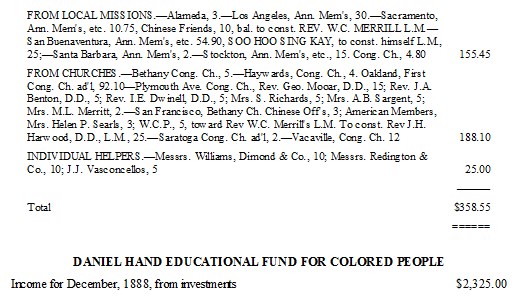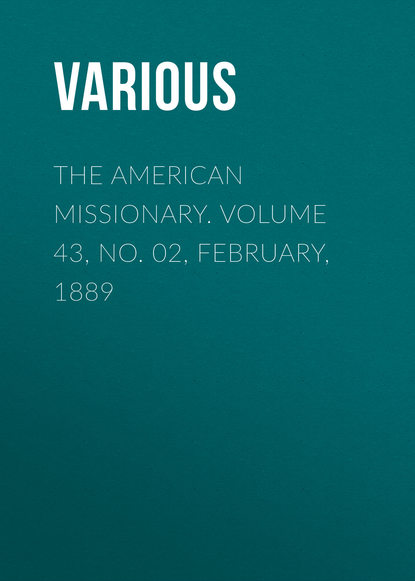 Полная версия
Полная версияThe American Missionary. Volume 43, No. 02, February, 1889
We entered the cabin to which we were going by a door-way in which we must needs bend our heads very low to get inside. The first thing that struck us was the gloom and darkness. In each corner of the room was a bed, with a smaller one pushed underneath, and two sick people suffering from slow fever. It is no wonder, for eleven people occupied this one room, about twelve feet square. Need we wonder that misery and squalor are seen all around? An old soap box from the grocery formed a corner cupboard. Two old chairs which perhaps belonged to their great-grandmother, all frame and no seat, an empty box, and a bucket of water with a tin scoop, formed the whole furniture of the mountain cabin. Poor souls! I was told that I had done wonders when one day, during an address, I got them to smile! It was quite a treat to see a smile upon their faces. Joy seems to be outside their domain altogether, and the worst feature appears to be that they have no desire for anything different. If they get the idea that you think them low down and want to lift them up, they at once commence to stretch themselves up to their full height and stand upon their dignity. They will not fail to tell you plainly that you must not think they belong to the "know-nothing" class. They "know what is right and what is wrong, without you coming here." This is often said, even by those who live immoral lives. Pride of race is often affected towards the colored people. A colored man unfortunately had been drinking and was left at the depot. Some one stumbled against him, saying, "I did not know it was a man; I thought it was baggage." His companion spoke up and said, "It isn't a man; it's a nigger." Often their children are bright, cheery-looking children, well-behaved, unassuming and quiet. These poor mountain people might do well to take a few lessons from many of their despised, dusky neighbors.
The whole work, in my little time among these people, has greatly touched my heart and drawn out my sympathies towards them.
ITEMS FROM THE FIELD
Trinity School, Athens, Ala.:
"During December there was a special religious interest in view of the meetings held by Rev. Mr. Wharton, your missionary evangelist. The meetings were well attended by our students and by the people. These meetings were greatly blessed to the quickening and upbuilding of Christians, and twelve persons professed conversion. All of our pupils except one, above the primary department, are professing Christians. Our student prayer meetings are exceedingly precious seasons to teachers and pupils. We have just organized a Young People's Society of Christian Endeavor which promises to be very helpful.
"On account of these meetings we could not make our usual preparations for a Christmas concert and presents to the children. Accordingly, we invited them all to our parlors to a reception on Wednesday the 26th, and to our great surprise, there came a Christmas box on Tuesday, with presents for every one, greatly to the joy of the little ones, yes, and of the large ones also. After the distribution of the gifts, delightful music bubbled from every throat, and the universal testimony was, 'This is the best Christmas I ever spent.'"
Straight University, New Orleans, La.:
"We are having a glorious revival. Every night during the Week of Prayer there have been glad hearts. I think there is scarcely a boarding student who is not thoroughly aroused. Most are seeking the Saviour. Eighteen have found peace. Many day students, and others who are not students, have been much interested. One young man who has been a scoffer at all good things, came to the meetings, and soon came under the influence and asked us to pray for him. As I write in Stone Hall, I hear on all sides the sound of prayer and singing."
The new church at Crossville, Tenn., was dedicated on Sunday, Dec. 30th. The new building is very tasteful and convenient, in a beautiful and central location. Six new members were received—all Northern people. The house was full both morning and evening. Much interest was shown. Rev. G.S. Pope preached in the morning and Rev. S.E. Lathrop in the evening.
Sherwood Academy opened its new winter term with increasing numbers. The school is gaining favor with all classes and is doing an excellent work.
"Habits and Manners," is the title of a neat little volume by Mrs. W.A. Armstrong, of Hampton, Va. It is made up of the lectures delivered by Mrs. Armstrong to the students of the Institution, and is a remarkably clear statement of the rules that should govern the habits and manners of ladies and gentlemen. These lectures, though originally addressed to colored students, are equally applicable to white people, for here, at least, color makes no difference. The book has many other items of interest, as for example, rules for cooking, recipes, etc.
THE CHINESE.
A GLIMPSE AT SHADY SIDE
REV. W.C. POND, D.DOur friends will get a quite one-sided and mistaken view of our work among the Chinese, as of any other missionary work, if they have nothing but the sunny-side reports to read. It is a war that we are waging, and war is serious business. The varied fortune of the battle involves defeats, incidental and temporary, on the way to the final victory. Sometimes it is hope deferred.
There are Chinese in whom we have come to be deeply interested, for whom we have long prayed, who have for years been among the most constant and most pleasing of our pupils, and for years have been convinced that an idol is nothing, but that the God of the Bible is the only true God, and the Christ of the Gospel the only true Saviour, who stop just there. Over and over again we ask about them, only to find them still just there. Not a step forward seems to have been taken, and meanwhile time—weeks that grow to months, and months that grow even to years— time that might be full of service, runs to waste. The heart gets sick with this hope deferred.
Then there are cases of disappointment. Bright hopes have darkened almost to the blackness of very despair. A brother whose conversion, (must I say apparent conversion?) has seemed to be unusually clear; whose walk as a Christian seemed, while he was with us, to be well-nigh perfect; whose spirit was singularly humble, devout and Christly; who was growing rapidly in knowledge of the word, and could already preach the word with power, goes back to his home in China. Sore pressure is brought to bear upon him, and he pays some sort of homage at an idol's shrine. He feels forthwith condemned. He will not be a hypocrite, and therefore will no longer profess to be a Christian. Now that he has returned to California, he is ashamed, he says, to show himself among the brethren. He stands aloof; keeps out of sight, and thus takes the very path along which Judas hastened to his doom. In vain do we show him the better way of faith; in vain speak to him of Peter, or of the Father's welcome to the prodigal, and the delight we once had in him adds soreness to the heartache of our disappointed hope.
These are not solitary cases. Yet we may thank God that they represent not the general rule, but the exceptions. The general rule is that of constancy and faithfulness, and these exceptions are such as occurred even in the Apostolic ministries: how much more to be expected in ours! Yet the pain they bring and the shadow they cast are none the less real and deep.
Another element in shady side arises in a quite different quarter. "Coming events cast their shadows before," and these shadows just now obscure our sunny side. We resolve not to be worried about to-morrow, and yet we must not enter doors that open except we first count the cost. That coming event is a deficit that seems inevitable, unless we shut our ears to what sound like the calls of God. Our plan heretofore has been to listen to these calls and answer them if possible, believing that he who gives the commission will not fail to supply the means. Nor has this faith been put to shame. Yet, when the rules of arithmetic confront one at every summing of his probable resources and subtracting of his fixed expenditures, and the figures, like fleshless, bony fingers, point him to deficits and unpaid bills impending, then, even while faith maintains her hold, it cannot be denied that shadows cross our path. Our friends who have helped us hitherto must expect some urgent appeals before this fiscal year is ended. The utmost economy shall be practised. Each dollar shall be made to do full service, if care and watchfulness on our part can assure this, but the work must not be hindered. Souls are at stake, priceless and immortal.
I have not yet reached the end of my catalogue of shadows, but I soon tire of looking at the shady side. Shadow pre-supposes sunshine, and sunshine there is, clear, abundant, having cheer in it for the present and promise for the future—promise of harvests such as may make this year to be as the last and even more abundant.
ANNIVERSARY OF CHINESE MISSIONS
Superintendent Dr. Pond is a modest man, and we, therefore, take the liberty of quoting from the Congregationalist a little sketch by our friend Dr. Holbrook, of the recent anniversary of the Chinese Mission as presenting a broad ray of sunshine over the "Shady Side," as given in Brother Pond's candid article above.
The Chinese Mission of the A.M.A. on the Pacific coast, under the superintendence of Rev. W.C. Pond, D.D., is very efficient and successful. Its thirteenth anniversary was held on Sunday evening, December 9, in the First Congregational Church in San Francisco, Prof. I.E. Dwinell presiding. The exercises by the Chinese converts indicated remarkable proficiency in the English language and in music, both in solos and choruses. Jee Gam, the first convert, and now employed by the courts as an interpreter, read an address on "The Congregational Association of Christian Chinese," of such merit in thought and language, that some doubted its originality, which, however, was vouched for by Dr. Pond. The writer sketched its origin in 1871 and the progress of the Association since, and said it had been the means of the conversion of more than 700 Chinese, and that it designs to send missionaries to China. It is self-supporting, though the expenditures during the year have been $9,619.50, of which $2,066 were for rent. Dr. Pond advocated the appointment of itinerant preachers to labor with the Chinese in the moving camps on the railroads. Rev. Dr. Barrows made a very effective appeal for funds, and a collection was taken. Dr. Pond certainly deserves great credit for his labors in this department, in addition to the pastorate of Bethany Church in San Francisco, in which there are a large number of Chinese.
BUREAU OF WOMAN'S WORK
MISS D.E. EMERSON, SECRETARYWOMAN'S STATE ORGANIZATIONS
CO-OPERATING WITH THE AMERICAN MISSIONARY ASSOCIATIONME.—Woman's Aid to A.M.A.,
Chairman of Committee, Mrs. C.A. Woodbury, Woodfords, Me.
VT.—Woman's Aid to A.M.A.,
Chairman of Committee, Mrs. Henry Fairbanks, St. Johnsbury, Vt.
VT.—Woman's Home Miss. Union,
Secretary, Mrs. Ellen Osgood, Montpelier, Vt.
CONN.—Woman's Home Miss. Union,
Secretary, Mrs. S.M. Hotchkiss, 171 Capitol Ave., Hartford, Conn.
N.Y.—Woman's Home Miss. Union,
Secretary, Mrs. William Spalding, Salmon Block, Syracuse, N.Y.
ALA.—Woman's Missionary Association,
Secretary, Mrs. G.W. Andrews, Talladega, Ala.
OHIO.—Woman's Home Miss. Union,
Secretary, Mrs. Flora K. Regal, Oberlin, Ohio.
IND.—Woman's Home Miss. Union,
Secretary, Mrs. W.E. Mossman, Fort Wayne, Ind.
ILL.—Woman's Home Miss. Union,
Secretary, Mrs. C.H. Taintor, 151 Washington St., Chicago, Ill.
MINN.—Woman's Home Miss. Society,
Secretary, Miss Katharine Plant, 2651 Portland Avenue, Minneapolis, Minn.
IOWA.—Woman's Home Miss. Union,
Secretary, Miss Ella E. Marsh, Grinnell, Iowa.
KANSAS.—Woman's Home Miss. Society,
Secretary, Mrs. G.L. Epps, Topeka, Kan.
MICH.—Woman's Home Miss. Union,
Secretary, Mrs. Mary B. Warren, Lansing, Mich.
WIS.—Woman's Home Miss. Union,
Secretary, Mrs. C. Matter, Brodhead, Wis.
NEB.—Woman's Home Miss. Union,
Secretary, Mrs. L.F. Berry, 724 N. Broad St., Fremont, Neb.
COLORADO.—Woman's Home Miss. Union,
Secretary, Mrs. S.M. Packard, Pueblo, Colo.
DAKOTA.—Woman's Home Miss. Union,
President, Mrs. T.M. Hills, Sioux Falls;
Secretary, Mrs. W.R. Dawes, Redfield;
Treasurer, Mrs. S.E. Fifield, Lake Preston.
We would suggest to all ladies connected with the auxiliaries of State Missionary Unions, that funds for the American Missionary Association be sent to us through the treasurers of the Union. Care, however, should be taken to designate the money as for the American Missionary Association, since undesignated funds will not reach us.
THE MOUNTAIN GIRLS
But why the girls? Because the girls are immortal as well as the boys. Because the girls in their education have been neglected far more than the boys. Because the girls are to be the mothers of the next generation.
That they are immortal, and capable of becoming and doing much in this life would seem to be doubted even by their parents. The neglect of the girls in their physical, mental, moral, and religious education, is enough to draw pity even from the most stupid Christian.
Hundreds are put into field work from spring till autumn. They follow the mule and "bull tongue." They wield the heavy hoe, sprouting newly cleared land. They look after cattle on the ranges and the mountain swine, and if these are needed for meat, kill and dress them as a man would do. Said a woman the other day, "I wish I had as many dollars as I have alone killed and dressed hogs." With parents the boy means a "heap" more than the girl. A boy can shoot deer and coon, fox and rabbit, can build cabins, can keep school, and "seems" be a doctor or go to Congress. With this impression, if anybody is clothed and sent to school, it is the boy, while as a rule, the girl is poorly clad and stays at home to do the boy's work, to make "craps," and grow up in ignorance. If in berry time they can get a few dimes to buy a calico dress and a pair of shoes, contentment settles over their faces. Aspirations for anything better they have not, for an avenue leading to a more hopeful life they have never dreamed of. To look into the future there is nothing sunny or bright. Illiterate, they marry young some poor fellow, and with no money they begin life, build their cabin home in the timber land, girdle a few acres of the stately trees of oak and chestnut, and there raise a family to take the same dark and gloomy view of life the parents have had.
Must this condition of things continue, among a people, too, who are all native born Americans, who have fair native abilities to become a power for good if trained in Christian schools?
Is it not time a special effort be made for these girls? They are growing older. They will soon be the mothers of a new generation. With illiterate mothers what will that generation be? Just what the present generation now is. What will it be if these girls now growing up are brought into a school like ours at Pleasant Hill? Here, if there can be sufficient room and ample teaching force, they will be taught and trained in a practical knowledge of all the duties of life, especially in those of the household. If we educate and save the girls we are using the very lever needed to lift these hopeless and neglected thousands living at our very doors, out of their degraded life and bring them into the light of the 19th century, and qualify them to take positions among the best women of the land.
The work for which I plead is full of encouragement and hope. It is not in Africa. It is within one or two days' ride of the largest and most wealthy churches of our country, those who love the Kingdom of Christ and have sent, and are still sending, their thousands of dollars to the ends of the earth, while these bright American girls are, by some strange oversight, neglected at our very doors.
The American Missionary Association has undertaken a noble work among them, and something has been accomplished, yet this good work has but just begun. The grey dawn has only cast a few signs of daylight over the mountains. To carry this work forward successfully in behalf of the neglected girls, there should be, in a great natural center of operations like Pleasant Hill, a spacious boarding hall with an industrial department and home, for those girls. It should not be stinted in size, but large, well-arranged, and well-equipped in all its departments from the primary upwards, where they can be taught everything a girl ought to learn, not only in books and in a Christian life, but taught to sew, knit, darn stockings, to make good bread, and keep house with order and neatness, and do everything needed to be done in a Christian home. If the native girls can come from their cabin homes into such an institution and be thus thoroughly trained, the axe is then laid at the very root of the tree of a squalid life of illiteracy, and a life of Christian culture and hope comes in its place, where Christian mothers throw angelic brightness over their households, and families of children are trained to act well their part in this great and growing nation. The institution I suggest, and for which I must plead, should not only be large enough to accommodate girls near at hand, but from other neighboring States who stand in need of such a home and training. It should be a Bethel for these immortal waifs, a house of bread, so well provided for as to take the poorest who cannot pay a cent of their own expenses. On this base it will be doing the greatest and grandest work possible for the two millions and a half who are scattered as lost sheep over the mountains of our own land.
B. DODGE.RECEIPTS FOR DECEMBER, 1888
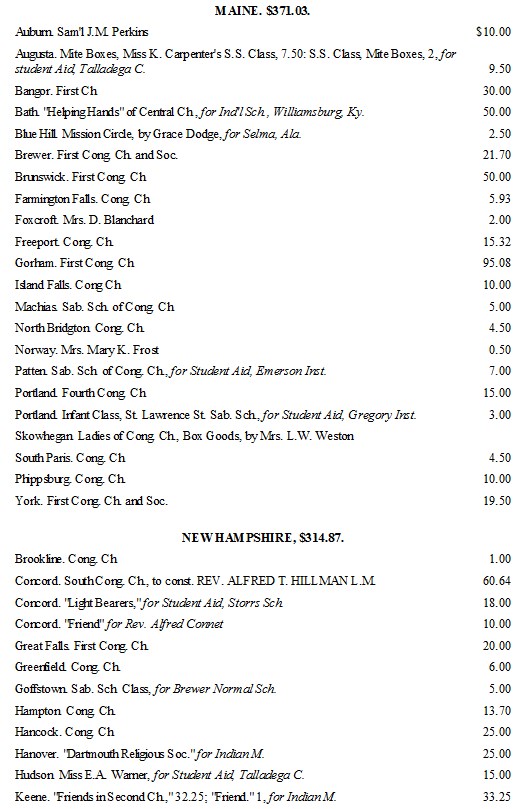
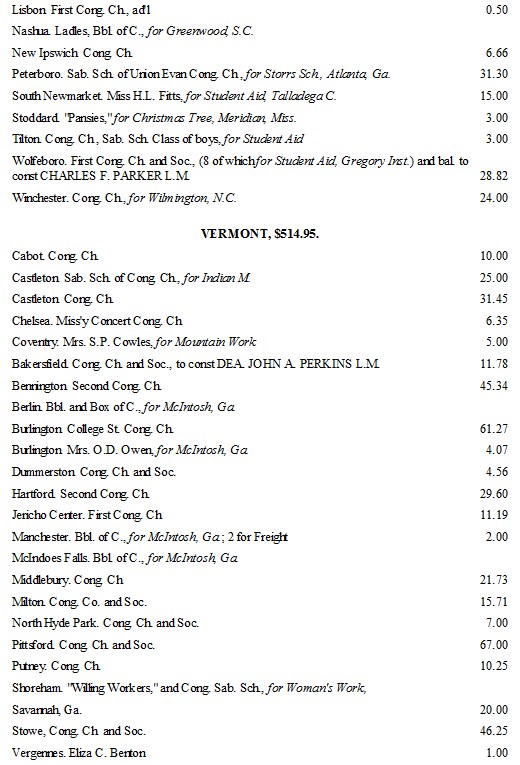
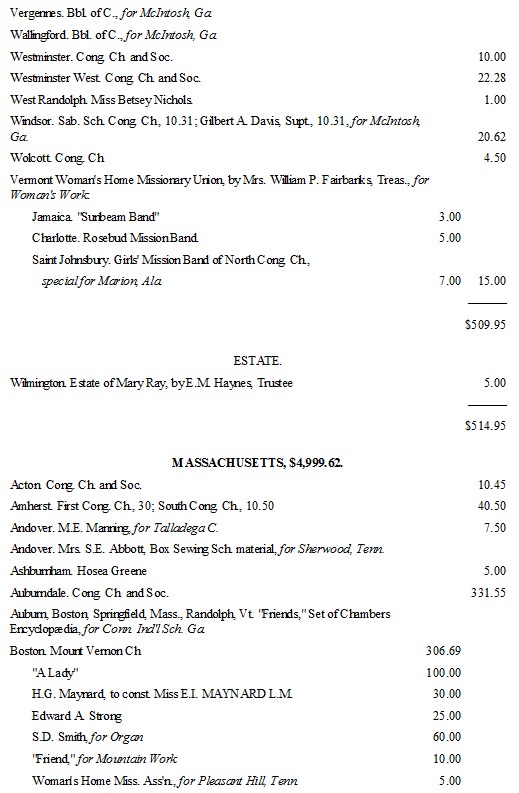
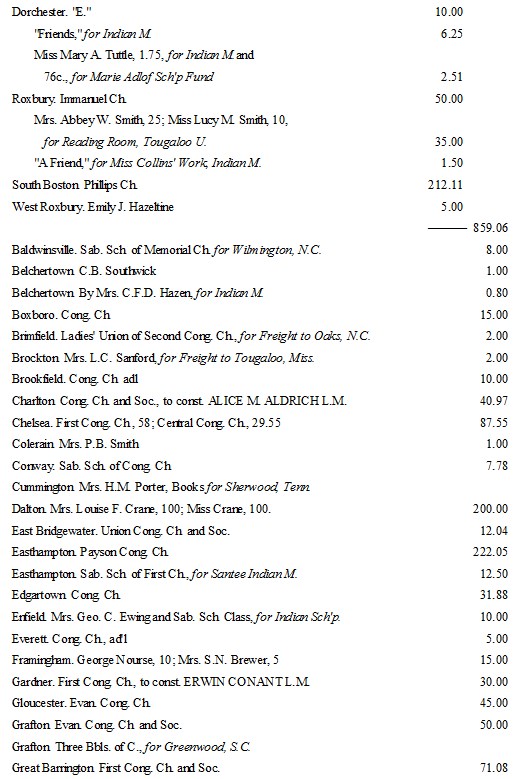
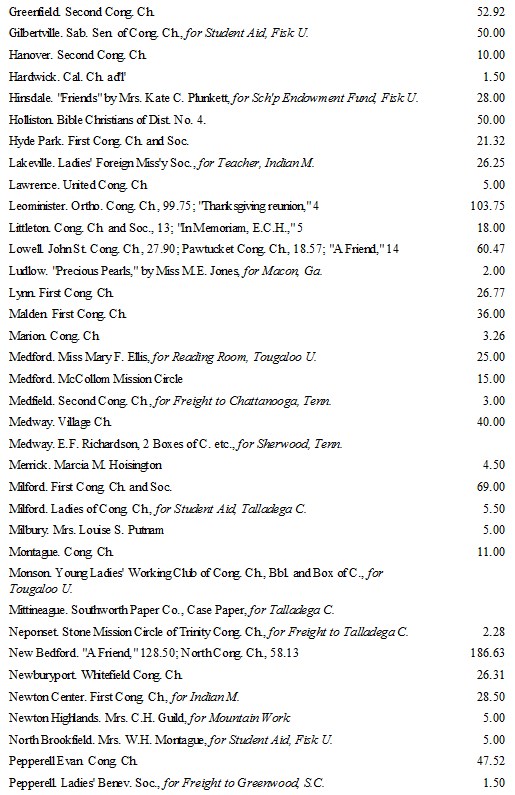
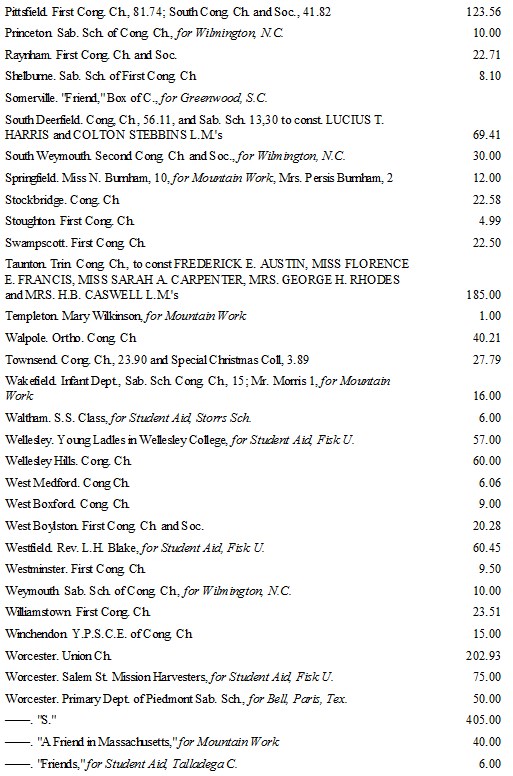
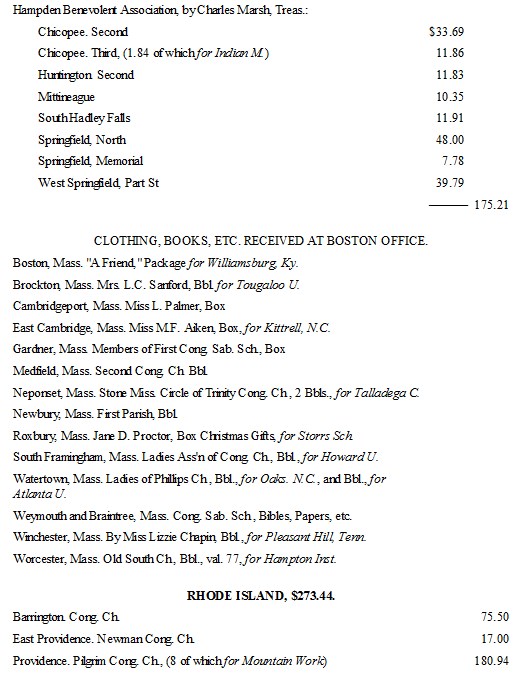
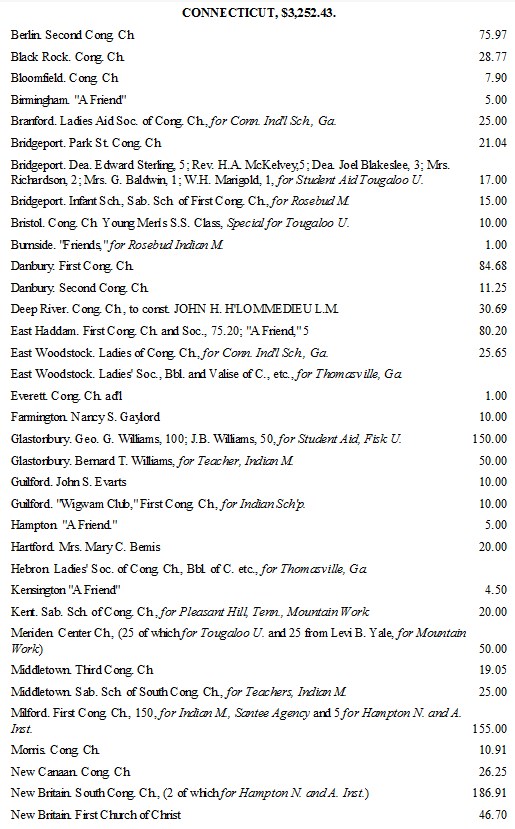
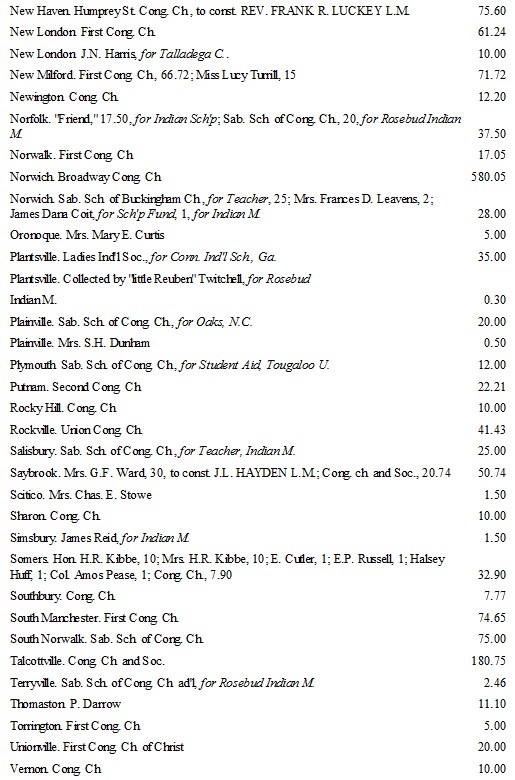
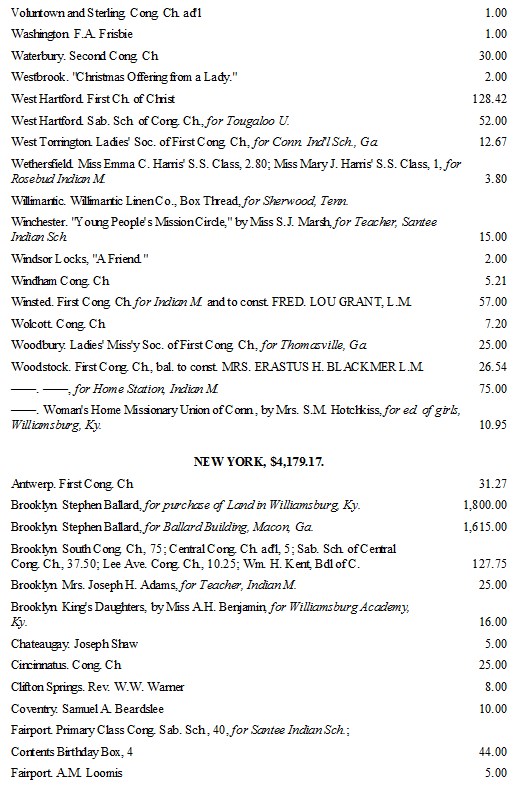
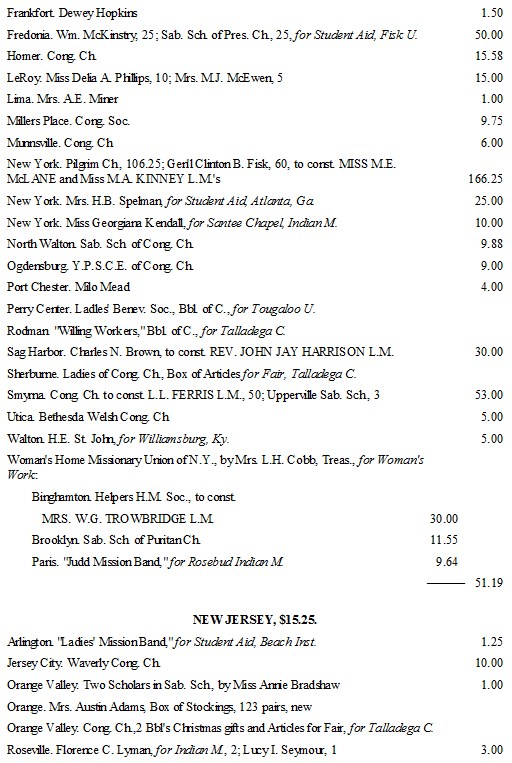

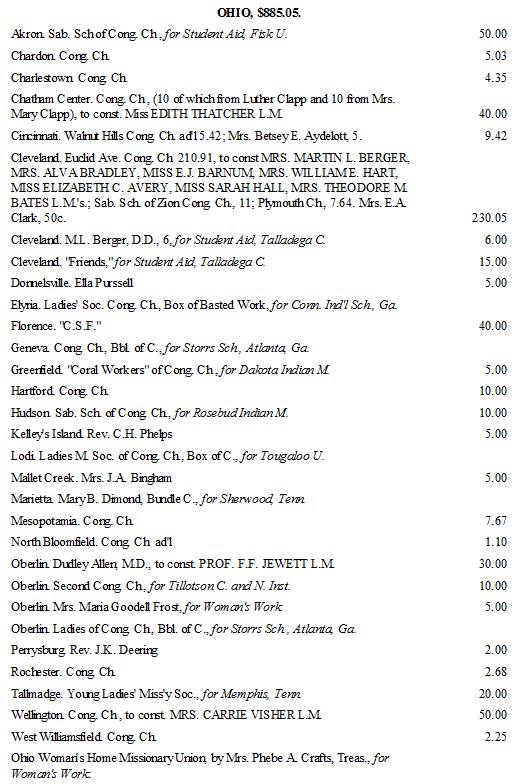
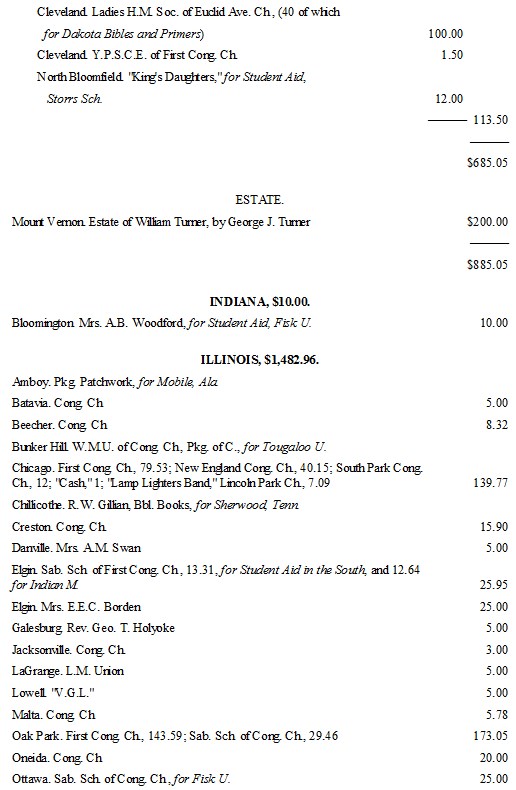
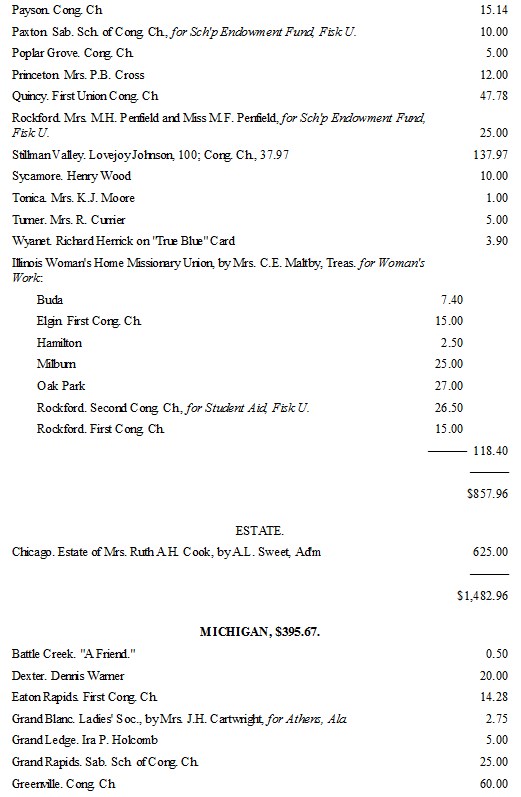
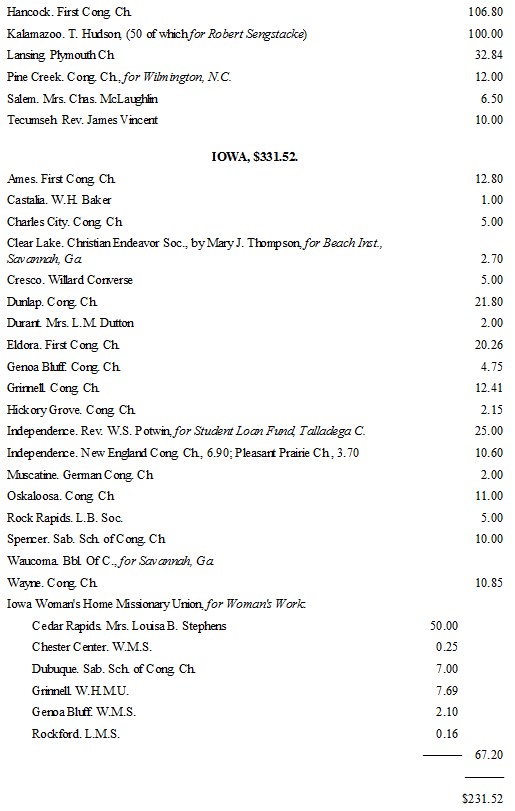
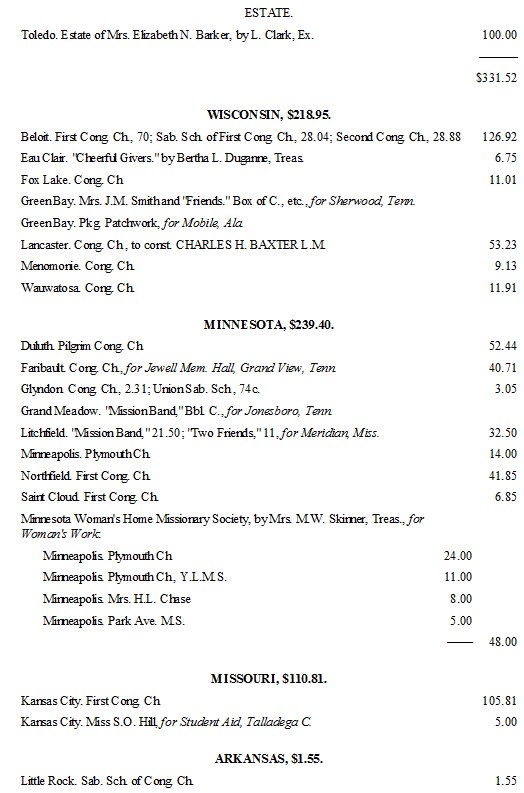
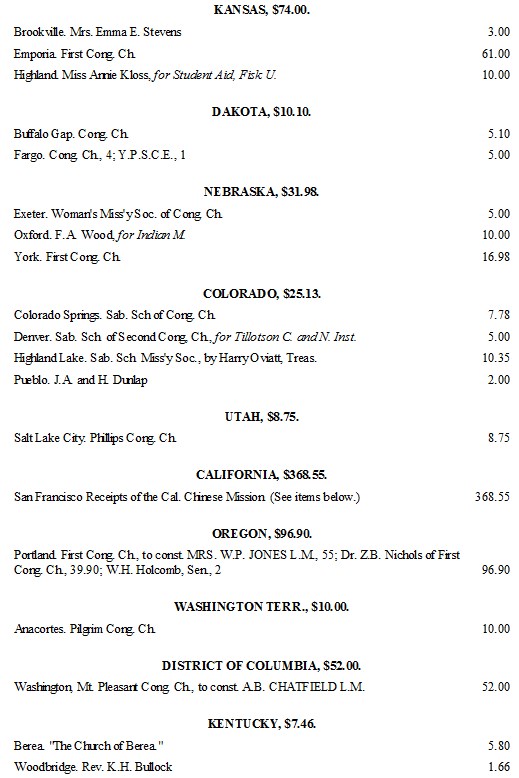
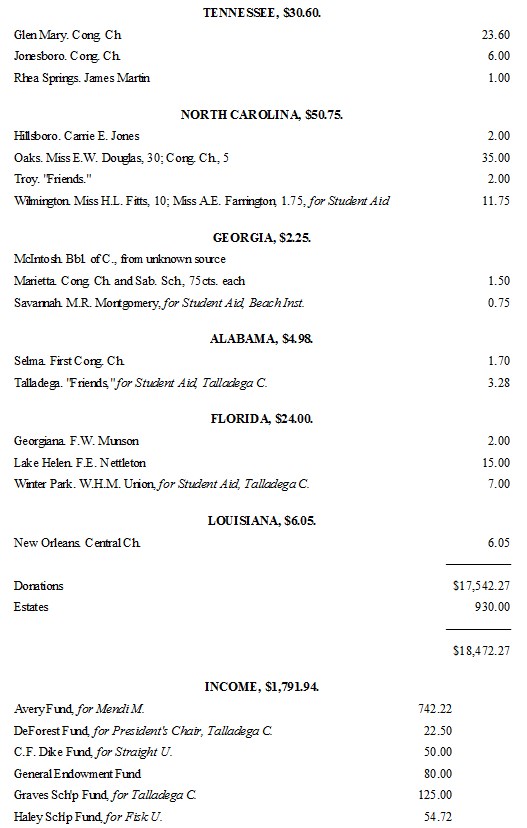
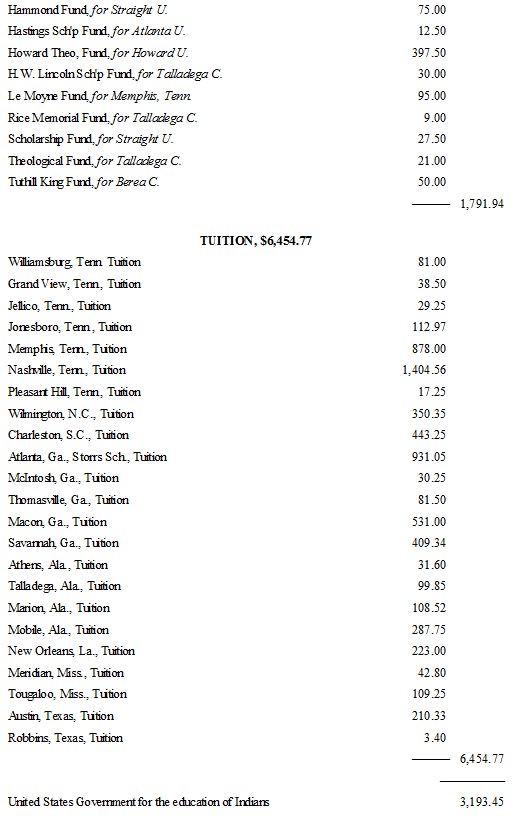
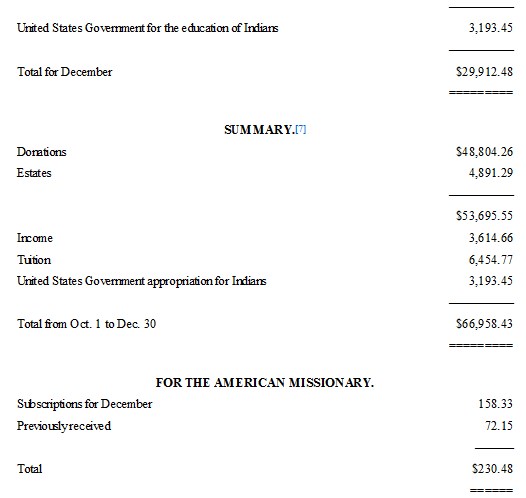
7 RECEIPTS OF THE CALIFORNIA CHINESE MISSIONS, between Sept. 21, 1888 and Nov. 20, 1888, to meet expenses of year ending Aug. 31, 1888.
